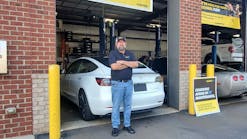Beware of shiny object syndrome when it comes to choosing and investing in new technology for your business.
However, keep your eyes open—wide open—and observe what’s happening with several key technologies that are poised to transform all industries, including quick lube.
What the Experts Say: AI
Little surprise, the first technology to closely watch is artificial intelligence, or AI.
“A lot of what’s going on with AI is object recognition. But what can it do for auto repair or quick lube?” asks Chris Cloutier, president and CEO of Autoflow, a Texas-based company that creates systems to automate workflow in the automotive service industry.
Essentially, AI creates data models, Cloutier explains.
“So, let’s say you load a million images into a machine, or model, and say, ‘This is a cat.’ And you load all different kinds and colors of cats. And then you load ‘dog,’ and say, ‘This is dog, not cat.’ So the [machine] gets smart and if it sees the tail, for instance, it knows it’s not the same animal—and [using this technology], 90-95% of the time we can identify cat versus dog.”
Next, Cloutier asks, “What if we start applying this to parts, to tires, and once the car pulls in, there are enough cameras on the tires and they can be identified?”
In an instance like this, the AI technology has saved the shop all the time it would take for a technician to look and identify the tire type.
“With the help of cameras, either on a tablet or in a bay, through object recognition, we can identify parts very quickly. We can cross-reference without the timely human recognition,” Cloutier says.
Then, the question for the shop owner becomes: How quickly can we get these parts to the vehicle?
Jon Vorisek, founder of RepairSurge, a software company based in Lansing, Michigan, concurs that AI is worth a quick lube shop owner’s time to investigate and observe. But how will artificial intelligence affect the oil change industry, specifically? It’s hard to say, he notes.
“But AI will come into play in some way,” Vorisek states. “That’s the area where the underlying technology is changing right now, in every industry.”
Bing, for instance, is a new AI technology that people can talk to, Vorisek notes. “I’m just speculating, but maybe the technology could suggest to [quick lube shop owners] things like, what customers are best to reach out to? What are the friction points in your day-to-day operations? It’ll be interesting.”
Vorisek predicts that, within the decade, most industries will be seeing how AI and machine learning can benefit their businesses—whatever space they’re in. And quick lube service providers will be among those rolling out the technology.
What the Experts Say: ADAS
The functions of Advanced Driver-Assistance Systems include things like emergency brake assist, adaptive cruise control, lane-centering and lane-keeping, surround view, pedestrian detection, and a host of others to help drivers steer clear of accidents. And these ADAS systems are made up of cameras, sensors, and a host of other technologies.
But is there a benefit at this time for quick lube shop owners to keep an eye on them?
“That’s a tough call,” Vorisek admits. “Investment in that area … in good, capable equipment, is not insignificant.”
In some areas, the RepairSurge founder suggests, there are facilities that are dealing specifically with ADAS systems. “They are custom-built for that and when people bring vehicles in with that technology, they have all the equipment, and they can cover a large service area.”
He ponders, “If I’m running an oil change shop, I don’t know if I’m trying to compete with that or send vehicles to that facility. It can almost be its own business model.”
Cloutier concurs. Quick lube owners and their shops’ technicians overall should be mindful of ADAS systems where a computer is actually making a car smarter.
“When you touch a vehicle now, car systems are more complicated, and things have to be more calibrated,” he notes. “If we change a simple part, the computer needs its correct driver loaded. It’s almost like when you used to have to download a new driver for your video card. When you have more sensors, they’ve got to be able to communicate with the car. And this will get more complicated over the years.”
So again, the pros’ advice is to not simply wait and see, but to keep on top of the issues and developments that will impact a shop sooner or later.
What the Experts Say: Basic Internet-Driven Efficiencies
It sounds obvious, but in the quick lube industry (and a number of others), business owners oftentimes lag behind in implementing even the most basic technologies that can save their businesses time and money.
One example is the use of cloud storage (storing data on internet servers instead of a computer’s hard drive), which is absolutely critical technology for any quick lube business to utilize. So if a quick lube owner is not already invested in online technology and the cloud, it’s high time, Vorisek says.
“If you have an oil change shop, pay special attention to how your customer comes back to your shop the next time,” he suggests. “Customer retention is the name of the game, and you want the customer who needs an oil change to for sure come back to your facility.”
When a shop’s records are in the cloud, shop owners and managers can automatically send customers offers and reminders by email and through physical mailers, as well.
“Don’t track this stuff by hand,” Vorisek states. “Tie into tech solutions that track this kind of stuff … whether you’re starting out or have been in the business for a while.”
For Cloutier, online tools are mission critical.
“It’s about bay efficiency,” he notes. “It’s real-time cameras that help the turn times in your bay [by tracking, free of manipulation] how long something sat in your bay.”
Computerized tools such as these also allow shops in the multi-care business to increase workflow efficiencies and profits, according to Cloutier.
In the multi-cares, for instance, a customer may come in for an oil change and an inspection shows that they have a leak and should come back.
“This turns into service … and dollars,” Cloutier says. “This goes back to AI in upcoming years, where shops will be able to track whose car is in the bay, how long was it there, and then there will no longer be manipulation of those models, but real-time statistics.”
He adds, “For quick lube, this is one of their biggest measurements: how fast can we turn a car.”
Last Lap
Even the most tech-savvy quick lube owner can be dazed by one particular technology and race toward it too fast. So the experts offer some simple criteria to help evaluate what makes the best business sense.
As Cloutier observes, take time to vet any new technology before you adopt it. “Keep your ears and eyes open, and apply what matters in your particular business and improves it. But you don’t have to be the first to adopt it.”
Vorisek, meanwhile, suggests that quick lube owners thinking about making a change to a new technology or investing in one of the up-and-coming tech options ask themselves several important questions, first.
“How’s it going to materially benefit you?” he stresses. “There must be a clear benefit that connects to your business goals, over time.”
And he adds, “Are we investing in tech that will put us on a good footing to move forward vs. tech that’s on its way out? Look on a case-by-case basis, do research, and be forward-thinking.”






